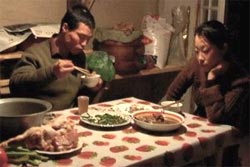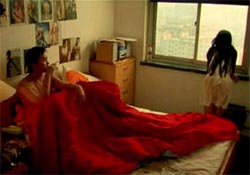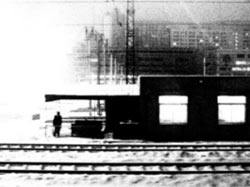How Is Your Fish Today? (2006, Dir. Xiaolu Guo)
"I think it must be nice because that's how I imagine it."
-- Tourist interviewed on train to Mohe
What do you do when you set out to make a documentary about a town that has a lot of romantic lore associated with it, and find out that the town isn't really all that? That's what confronted the director of this movie, and
How Is Your Fish Today? is her response.
The town in question is Mohe, the northernmost village in China and supposedly the best place in the country to catch the Northern Lights. The film starts with random interviews of passengers on the train to Mohe, and their thoughts on traveling to this near-sacred location. And then fiction enters the fray -- we are introduced to Rao Hui, a struggling soap opera screenwriter in Beijing who is trying to jump-start his career with something, anything fresh. Spending aimless days at home with his goldfish "Belle du Jour" (he's a sucker for European New Wave), he hits on the story of a young escaped murderer named Lin Hao, and his protracted journey to Mohe. And so it goes for the rest of the film -- straight documentary material about Mohe juxtaposed with the story of Lin Hao, much of it told with voice-over narration and saturated still photographs, like Chris Marker's film
La Jetee (the original inspiration for Terry Gilliam's
12 Monkeys).
Unfortunately, I missed the screening that included a Q&A with Guo Xiaolu, the film's director; I would have liked to have asked her what the principal thrust of the narrative is. The fictionalized story of Lin Hao takes some interesting detours, including an interlude in a basement hostel in Wuhan where he meets a chatty salesman, and a tryst with a woman who offers him shelter in Beijing, but soon this plot within the plot is divorced from motive and motivation. The character of the screenwriter Rao Hui receives a bit more development -- it's clear he's tired of the city life and looks to the stories of Mohe, and Lin Hao, as some sort of enactment of his vicarious dreams. Still, all this feels like padding, a feint to draw our attention away from the flimsiness of the central documentary.
 |
But the funny thing is that the best aspect of the film is the straight documentary footage of Mohe. It isn't anyone's idea of a postcard village, and yet the daily routines there have an undeniable charm -- the social gatherings at the local church, the easy banter between a husband and wife as he devours fish at the dinner table and she just watches, the radiant glow of a stove at night (the only "Northern Lights" the director witnessed, apparently), the catching of fish in a frozen lake. In the end, Rao Hui is somber, his illusions about this magical place shattered, as he literally abandons his character Lin Hao in the snowy wilds: "All that remains is this naked icy landscape. But I needed to come here to see that there's nothing to see. Now I feel peaceful." Maybe his comment is commentary on the jaded urbanite's need to believe in the healing powers of nature and good old-fashioned rural living, and all those other cliches, but even though the film is artfully shot on DV and deserves points for its unusual approach, it still strikes me as the plaint of a director who is disappointed that her film subject wasn't all that.





0 Comments:
Post a Comment
<< Home